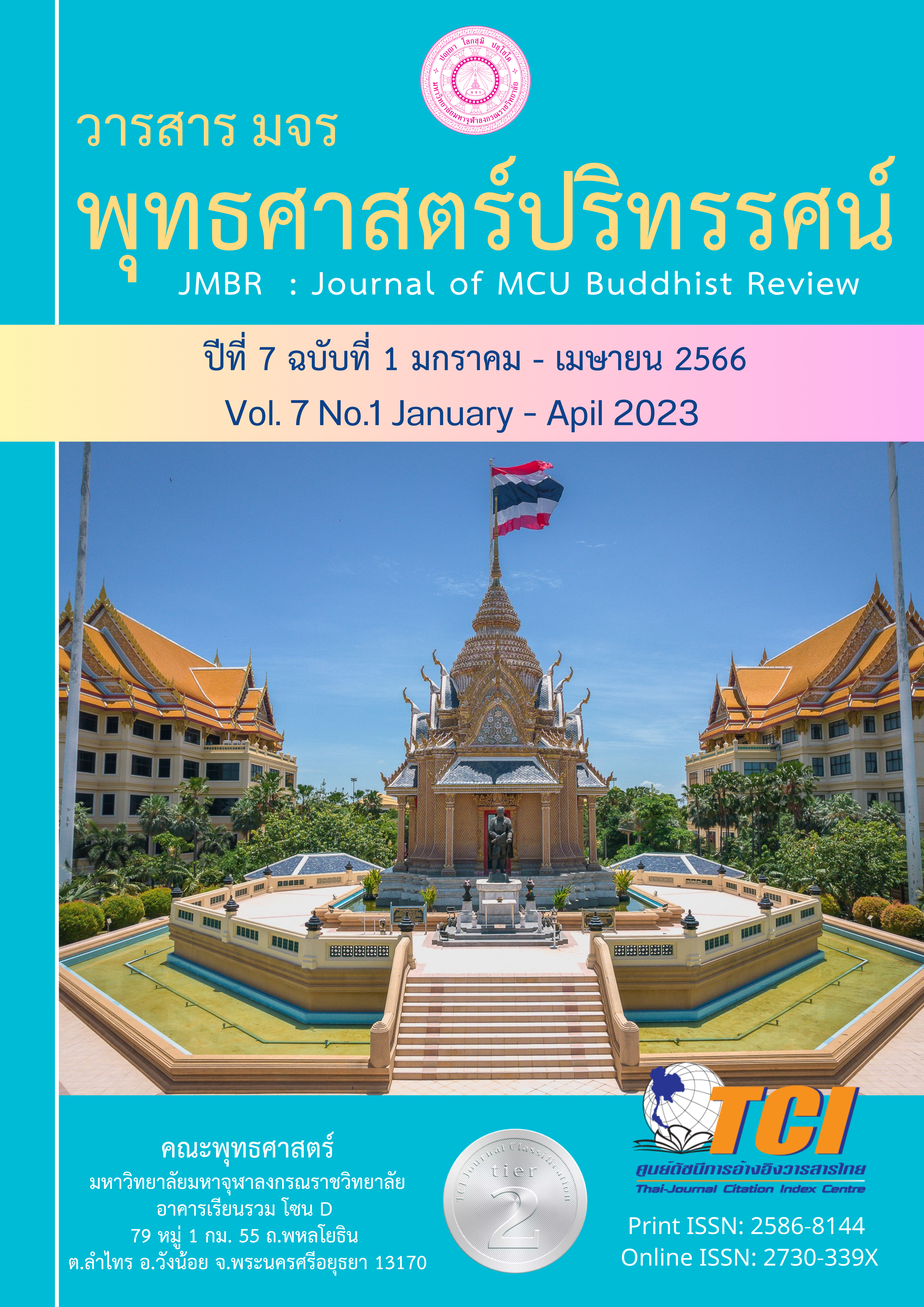การพัฒนาพฤติกรรมเยาวชนต้นแบบการตื่นรู้เชิงพุทธ
Main Article Content
บทคัดย่อ
เหตุปัจจัยทั้งภายใน ภายนอก และสิ่งแวดล้อมต่างๆ มีอิทธิพลต่อพฤติกรรมของเยาวชน หลักการทางจิตวิทยาเห็นความสำคัญของพฤติกรรม พัฒนาการในพระพุทธศาสนาคือกระบวนการพัฒนาพฤติกรรม จิตใจ และปัญญา มีหลักการว่ามนุษย์ทุกคนมีศักยภาพที่จะพัฒนาตนได้ แนวทางการพัฒนาพฤติกรรมเยาวชนต้นแบบการตื่นรู้เชิงพุทธบูรณาการ เป็นการประยุกต์ใช้หลักธรรมสำคัญที่เป็นพื้นฐานในการศึกษา ได้แก่ ปรโตโฆสะและโยนิโสมนสิการ ศรัทธา 4 การคบเพื่อน มิตรแท้และมิตรเทียม หลักการปฏิบัติวิปัสสนากรรมฐานตามแนวสติปัฏฐาน 4 กับหลักการทางจิตวิทยา เช่น พฤติกรรมเยาวชน ทฤษฎีการเรียนรู้ทางสังคม ซึ่งจะมีผลให้เยาวชนเป็นผู้ที่มีปัญญาการตื่นรู้ มีความเชื่อมั่นถูกต้อง มีพฤติกรรมดีงาม มีการฝึกฝนตนถูกต้อง
Article Details

อนุญาตภายใต้เงื่อนไข Creative Commons Attribution-NonCommercial-NoDerivatives 4.0 International License.
- บทความที่ได้รับการตีพิมพ์เป็นลิขสิทธิ์ของวารสาร มจร พุทธศาสตร์ปริทรรศน์
- ข้อความใดๆ ที่ปรากฎในบทความที่ได้รับการตีพิมพ์ในวารสาร ถือเป็นความรับผิดชอบของผู้เขียนบทความ และข้อคิดเห็นนั้นไม่ถือว่าเป็นทัศนะและความรับผิดชอบของกองบรรณาธิการวารสาร มจร พุทธศาสตร์ปริทรรศน์
เอกสารอ้างอิง
กาญจนา นาคสกุล. (2556). การกำหนดอายุเยาวชน พจนานุกรมราชบัณฑิตยสถาน. กรุงเทพฯ:สำนักงาน ราชบัณฑิตยสภา.
กมุท. (2560). แนวความคิดพื้นฐานเกี่ยวกับการพัฒนาเยาวชน. สืบค้น 10 กรกฎาคม 2565 จาก http://arts.kmutt.ac.th/
กรมสุขภาพจิต. (2555). Website Policy | Privacy Policy. กรุงเทพฯ: กระทรวงสาธารณสุข.
กรรณิการ์ ภิรมย์รัตน์. (2555). แนวทางการพัฒนาพฤติกรรมทางจริยธรรมของนักศึกษามหาวิทยาลัย ราชภัฏในเขต กรุงเทพฯ. กรุงเทพฯ: มหาวิทยาลัยราชภัฏสวนสุนันทา.
ปาณิภรณ์ ธีระวงศนันท์. (2564). การเสริมสร้างคุณลักษณะเยาวชนต้นแบบตามนโยบายปฏิรูปการศึกษา. วารสารวนัมฎองแหรกพุทธศาสตรปริทรรศน์. 22(1), 95-107
พระสรวิชญ์ อภิปญฺโญ. (2560). การสร้างและพัฒนารูปแบบการลดพฤติกรรมความรุนแรงของวัยรุ่นตาม แนวทางพระพุทธศาสนา.สืบค้น 10 สิงหาคม 2565 จาก http://www.mcu.ac.th.
พุทธทาสภิกขุ. (2525). ท่านพุทธทาสกับการศึกษา. กรุงเทพฯ: คุรุสภา.
พระพรหมคุณาภรณ์ (ป.อ.ปยุตฺโต). (2546). พจนานุกรมพุทธศาสตร์ ฉบับประมวลธรรม. กรุงเทพฯ: มหาจุฬาลงกรณราชวิทยาลัย.
มหาจุฬาลงกรณราชวิทยาลัย. (2539). พระไตรปิฎกภาษาไทย ฉบับมหาจุฬาลงกรณราชวิทยาลัย. กรุงเทพฯ: มหาจุฬาลงกรณราชวิทยาลัย.
มหาจุฬาลงกรณราชวิทยาลัย. (2559). พระไตรปิฎกและอรรถกถาภาษาไทย ฉบับมหาจุฬาลงกรณราช วิทยาลัย. กรุงเทพฯ: มหาจุฬาลงกรณราชวิทยาลัย.
ศรีเรือน แก้วสังวาล. (2540). หนังสือจิตวิทยาพัฒนาการชีวิตทุกช่วงวัย เล่ม ๒. กรุงเทพฯ: สำนักพิมพ์
มหาวิทยาลัยธรรมศาสตร์.
สุชา จันทร์เอม. (2540). จิตวิทยาพัฒนาการ. กรุงเทพฯ: ไทยวัฒนาพานิช.
สุรางค์โค้วตระกูล. (2545). จิตวิทยาการศึกษา. กรุงเทพฯ: ด่านสุทธาการพิมพ์.
สำนักงานคณะกรรมการพัฒนาการเศรษฐกิจและสังคมแห่งชาติ. (2560). ทิศทางของแผนพัฒนา เศรษฐกิจ และสังคมแห่งชาติ ฉบับที่ 12 พ.ศ. 2560-2564. กรุงเทพฯ: สำนักงานคณะกรรมการ พัฒนาการเศรษฐกิจและสังคมแห่งชาติ.
สถาบันจิตวิทยาความมั่นคง. (2550). การปลูกฝังและเสริมสร้างคุณธรรมในเด็กและเยาวชนของชาติ. กรุงเทพฯ: ฝ่ายปฏิบัติการจิตวิทยา กองบัญชาการทหารสูงสุด.
สมเด็จพระพุทธโฆษาจารย์ (ป.อ.ปยุตโต). (2564). พุทธธรรมฉบับปรับขยาย. Printed in Chaina.


